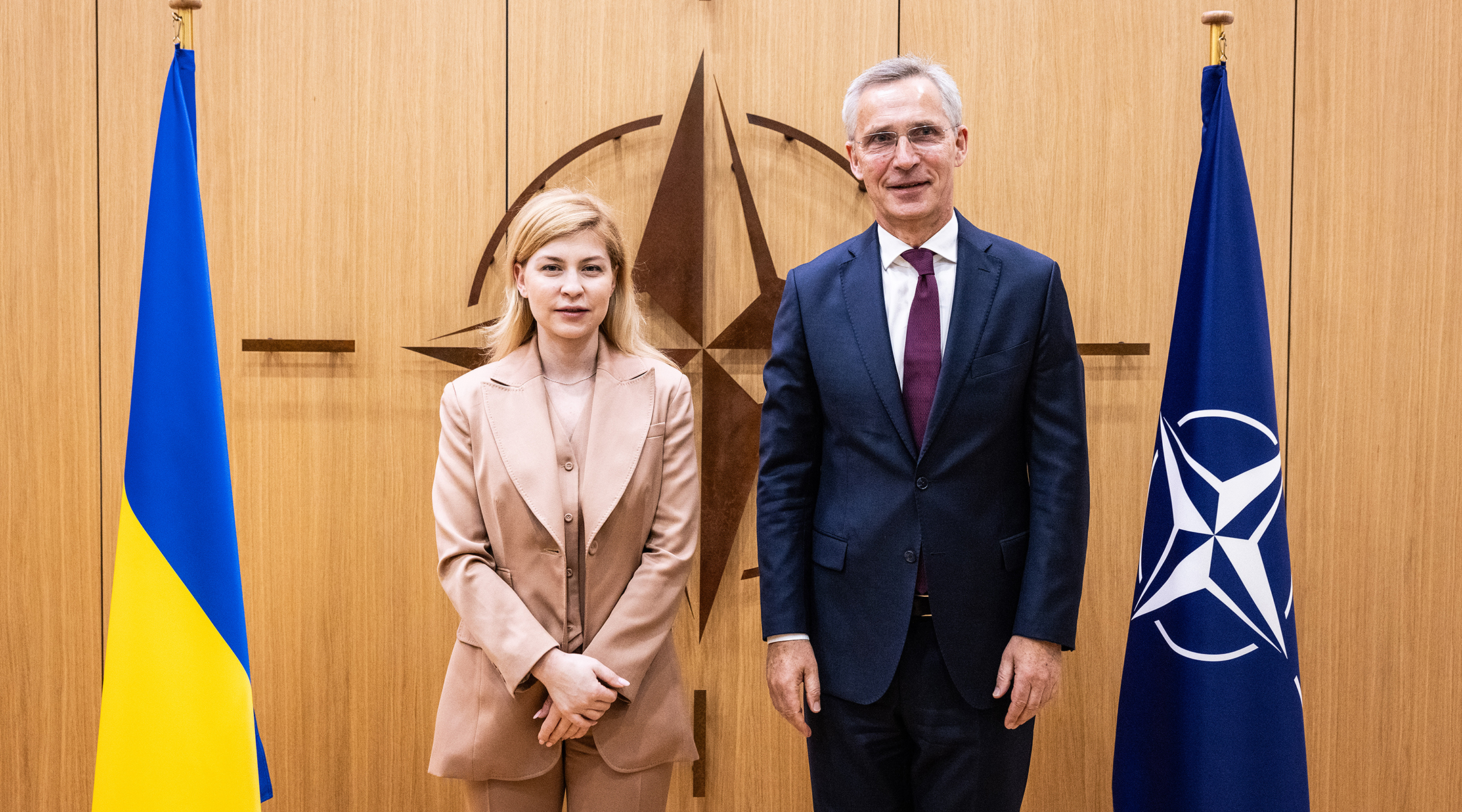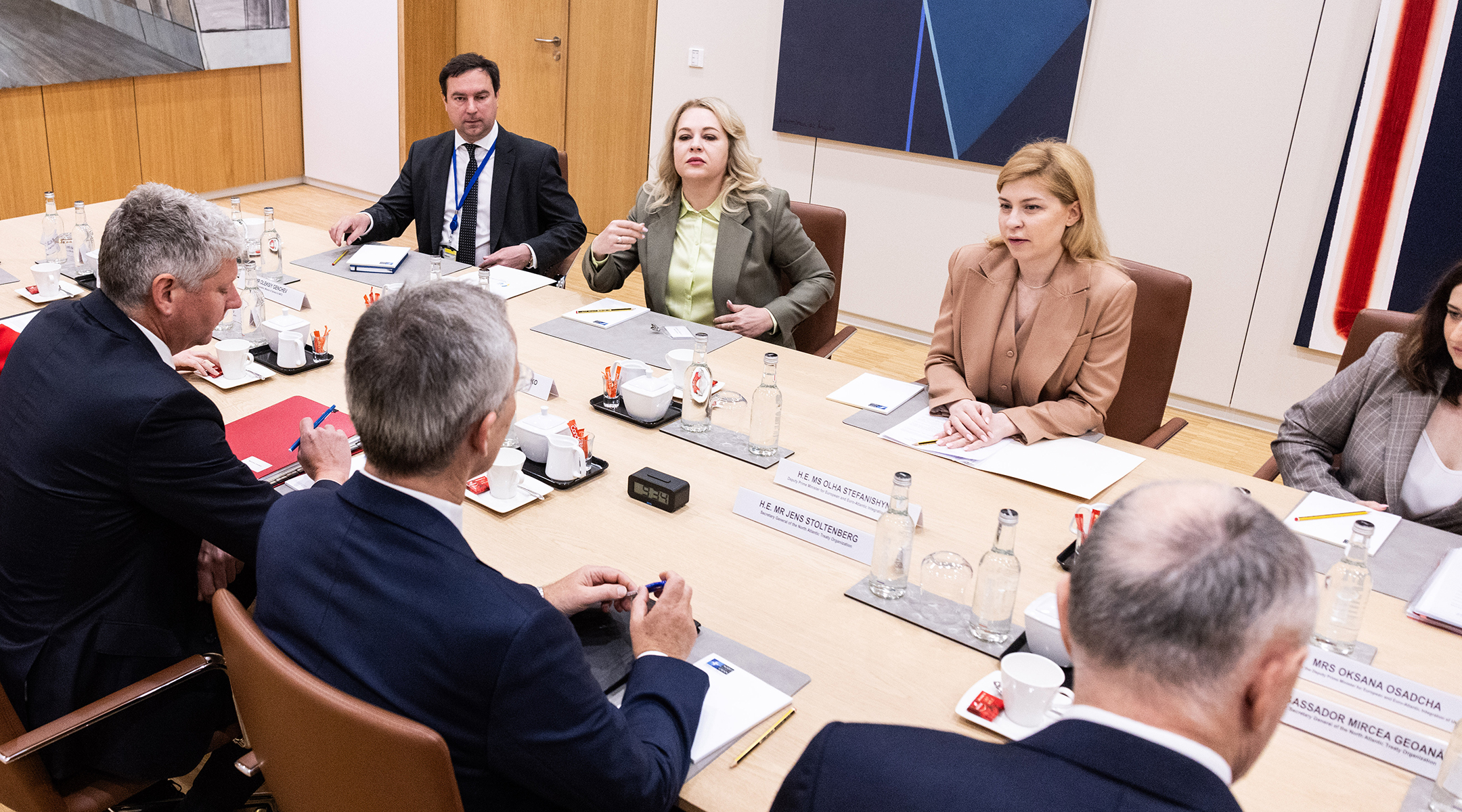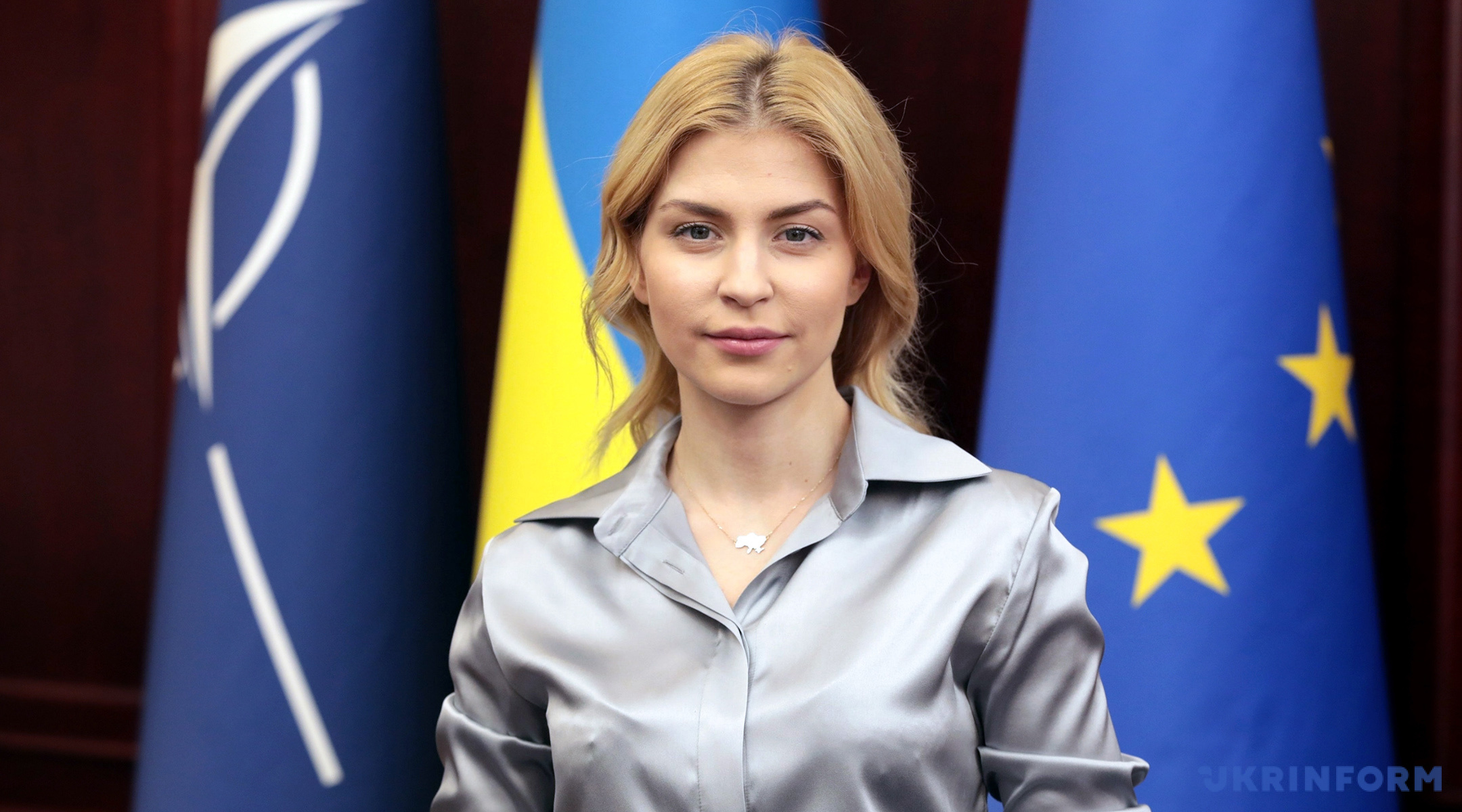This week in Brussels has seen a multiplicity of events relating to European security. This theme was debated during two separate meetings of the EU Council of Ministers attended by ministers for foreign affairs and defense, as well as during the Schuman Forum on Security and Defense. On Tuesday, May 28, Ukrainian President, Volodymyr Zelensky and Belgian Prime Minister, Alexander De Croo signed a bilateral agreement on security and long-term support, and Ukraine inked similar deals with Portugal and Spain a few days earlier.
Finally, a meeting of the NATO-Ukraine Council was held at the NATO headquarters, attended by the Ukrainian Deputy Prime Minister for European and Euro-Atlantic Integration, Olha Stefanishyna among others. During post-meeting conversations with the media, Ms Stefanishyna answered questions from Ukrinform, which turned into an unplanned blitz interview.
IN VIEW OF RUSSIA'S ACTIONS, THE NEED TO INVITE UKRAINE INTO NATO IS OBVIOUS
- NATO Secretary General, Jens Stoltenberg has unequivocally stated that he does not see a consensus among Allies regarding an invitation for Ukraine to join NATO at the upcoming NATO Washington Summit. Can the situation on the Ukrainian battlefield influence and affect such attitudes of the Allies?
- It is indisputable that the current developments taking place in Ukraine have their impact on decisions relating primarily to the provision of air defense capabilities to Ukraine. Because the Russian Federation, in addition to its goal of occupying certain territories, uses depopulation tactics, which is exactly what is happening now at the Kharkiv front line. In fact, conditions are being set in the Kharkiv region where people will not be able to live and economy to develop there. Accordingly, the need for air defense capabilities is growing so that Ukraine can exist further. This is true not only for the Kharkiv region, but also for Sumy Oblast, Zaporizhzhia and other southern front lines.
Indeed, the situation on the battlefield does affect the decisions made by Allies. But with regard to the invitation, there are other factors involved. One such is Russia’s disagreement with how the Allies view the borderlines in the Baltic Sea. It is, of course, kind of a game, but the buoys in the Estonian territorial waters have disappeared. Had this happened in Ukraine’s territorial waters in the Black Sea, this would have been considered an attempted violation of maritime borders.
For now, all these events are laid down in decisions reflecting the understanding that this war in Ukraine must be ended, that Russia definitely has the intention to attack or expand its war of aggression to the territory of Allies, a proof of which can be found in relevant decisions made by Russian leaders. In this context, the issue of an invitation (for Ukraine to join NATO – Ed.) will no longer have a great political significance as the need for such a decision has become too obvious.

NATO AIR DEFENSE FORCES COULD PROVIDE COVERAGE FOR PART OF UKRAINE’S TERRITORY
- Have the Allies considered setting up an air defense umbrella over Ukraine’s western border in order to provide protection for both Ukraine and neighboring Allies?
-Yes, they have. Today, at the NATO-Ukraine Council meeting, I raised this issue, along with the issue of the need for Ukraine to have at least seven (but probably three) additional "Patriot" systems that will enable Ukraine to secure its sky. That said, given that the Allies so far cannot coordinate their efforts in such a way to make sure that all these systems be delivered immediately, some of the Patriot systems deployed in countries on NATO’s eastern flank could be engaged to protect airspace over those countries, while at the same time providing air defense coverage for a certain part of Ukraine’s territory to secure NATO's borders.
I know exactly what such a decision should be like. This decision can be adopted by the NATO Military Committee. It was I who offered it. This decision is currently under consideration. A formal request from the Ukrainian side -- the Armed Forces and the Ministry of Defense -- was sent earlier, and today by me as well.
NUCLEAR DETERRENCE REMAINS CRITICAL FOR THE ALLIANCE
- During the discussion at the NATO-Ukraine Council meeting, did the attendees from the Allied countries say anything about Russia’s nuclear blackmail, in particular, about Russia deploying its nuclear weapons to Belarus? Are any initiatives currently being considered regarding Ukraine potentially deploying on its soil some of Western missile defense capabilities or even certain elements of the Allied countries’ nuclear weapons?
- It comes to reason that this is not the kind of information I would communicate publicly. When talking about the need for securing Ukrainian skies and protecting the borders of NATO Allies, these issues are considered in one single package. This issue is seen to be of particular relevance to our French counterparts who are already exploring a decision to send their military instructors to Ukraine. For a nuclear capable power such as France, the issue of nuclear deterrence is of paramount importance. It is my confidence that that country will be able to play a highly visible role in this domain in the near future.

GLOBAL PEACE SUMMIT COULD CREATE A NEW INTERNATIONAL INSTRUMENT AGAINST WAR
- What are you expecting from the upcoming Peace Summit in Switzerland, in particular, considering the fact that, as President Zelensky pointed out, the leaders of more than 90 countries have been invited to attend this forum? How can their views influence the clarification or transformation of the Ukrainian peace formula? Or will we simply communicate our views to them?
- The Peace Summit is without doubt the first major international platform to be aimed at terminating the war and restoring peace in Europe. Before that, we were talking primarily about military aid, about the fact that Ukraine is fighting on the battlefield for its independence. Therefore, this is the beginning of a large political dimension of ending the war.
Indeed, there will be certain modifications, and there has already been announced an option for the next meeting in one of the Arab World countries. But I can say that today, at the level of the NATO-Ukraine Council, all the Allies, from the United States of America to Turkey, reaffirmed their commitment to attending this event; they announced that prime ministers or leaders of their respective countries would attend the Peace Summit in Switzerland.
The importance of this platform cannot be overemphasized. Because, after the end of the Second World War and the creation of the international law system, this provides the only new tool that makes it possible to end this war without being bound by certain convention mechanisms.

UKRAINE AND ALL OF THE WORLD MUST BE RESILIANT TO RUSSIAN DISINFORMATION
- Reports have been circulating in the public domain that one of the Arab World countries that you’ve mentioned committed to host an international conference in the fall of this year. That conference will involve attendees from the European Union and the Russian Federation and will discuss how to end this war and restore peace in Ukraine. Does the Ukrainian side know any details about this, and is a mediation of this kind acceptable for Ukraine? What can be negotiated with Russia at this time?
- We definitely have to concentrate now on the Peace Summit, which is set to take place in June in Switzerland. We should focus on ensuring the highest political representation not only of our closest allies, but also of the countries of the Global South, Asia.
We must focus on making sure that Russia’s disinformation campaigns never succeed. This is defaming the Ukrainian authorities, this is defaming the Peace Formula and the Peace Summit as such, and this is aimed to disrupt the success of the event. We have to direct all our efforts to this end, and, based on the results to be achieved at the end of the Peace Summit, we will understand what kind of measures should be taken next to implement President Zelensky's Peace Formula.
But let's not have any illusions that the Russian Federation is really willing to be a party to constructive, meaningful talks. On the contrary, aside from speculations about the “expired legitimacy” of the Ukrainian authorities, we are hearing statements made by certain third countries suggesting alternative platforms and alternative "peace formulas". This comes from the desire to stretch out the agenda, just like they (the Russians) have a desire to stretch out the front line. So we need to remain resilient, not disperse our focus, concentrate on those decisions that are important today.
- Precisely in view of the suggestions being pushed for by some of these third countries, in particular, China and Brazil, regarding "alternative ways" to peace in Ukraine, I would like you to give an explicit answer to whether Ukraine is ready to give up its aspiration of NATO membership for the sake of peace.
- The NATO-Ukraine Council meeting has been over just less than an hour ago. It put on record very explicitly that Ukraine's path to NATO membership is irreversible. It is viewed so not only by Ukraine, but all of 32 NATO Allies as well.
Interviwed by Dmytro Shkurko, Brussels
Photo Credit of Hennadiy Minchenko, NATO Press Office
